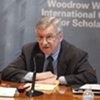The Conflict-Development Nexus: Exploring the Role of Foreign Assistance in Promoting Peace in Pakistan
Ambassador William Milam, Senior Policy Scholar, Woodrow Wilson International Center for Scholars; Ambassador Teresita Schaffer, Director, South Asia Program, Center for Strategic and International Studies; Joseph Bock, Vice President, American Refugee Committee
Overview
Ambassador William Milam, Senior Policy Scholar, Woodrow Wilson International Center for Scholars; Ambassador Teresita Schaffer, Director, South Asia Program, Center for Strategic and International Studies; Joseph Bock, Vice President, American Refugee Committee.
Milam, Schaffer and Bock outlined the underlying reasons for instability in Pakistan and addressed the implications for U.S. assistance in the context of the renewed strategic importance of Pakistan as a U.S. ally.
Ambassador Milam began the session by  characterizing Pakistan as a country that could be an ideal starting point in the U.S. bid to democratize the Middle East. Of immense geo-strategic importance to the U.S., the country needs a stable partner to assist it in its internal struggle between those who want to modernize Pakistan and those who prescribe to a fundamentalist Islamic ideology Milam referred to as anti-modern. U.S. assistance should be long-term and geared towards stemming the demise of state authority and fostering economic and social development, thus strengthening Pakistan's ability to compete in the 21st century.
characterizing Pakistan as a country that could be an ideal starting point in the U.S. bid to democratize the Middle East. Of immense geo-strategic importance to the U.S., the country needs a stable partner to assist it in its internal struggle between those who want to modernize Pakistan and those who prescribe to a fundamentalist Islamic ideology Milam referred to as anti-modern. U.S. assistance should be long-term and geared towards stemming the demise of state authority and fostering economic and social development, thus strengthening Pakistan's ability to compete in the 21st century.
Ambassador Schaffer presented the results of a CSIS-study and simulation on U.S.-Pakistani relations. Schaffer portrayed U.S. ability to foster social and economic development in Pakistan as a prerequisite of achieving other strategic objectives, for example in the "war on terror." Schaffer outlined the political, institutional, ethnic and economic determinants of Pakistan's strategic behavior. While U.S. assistance can make a contribution to making Pakistan more stable, Schaffer warned against using economic assistance as a means of political leverage. Rather, long-term assistance in rebuilding Pakistani institutions and economy, strengthening civil society, and forging economic ties between the U.S. and Pakistan could be embraced by the Pakistani government as serving its own national interests.  Such assistance is also a necessary investment if Pakistan is to play a genuine role in helping the U.S. to reach other strategic goals.
Such assistance is also a necessary investment if Pakistan is to play a genuine role in helping the U.S. to reach other strategic goals.
Bock discussed how the work of NGOs in Pakistan has affected ethnic, communal and religious conflict. Drawing on his own experience in the field he noted that NGOs must be sensitive to existing tensions in order to avoid exacerbating conditions of inequality that cause them. Bock stressed that NGOs can play a constructive role in defusing ethnic tension by formalizing interethnic association and providing early warning and response mechanisms in tension-prone regions. Pointing out that religion is an important dimension most government donors prefer not to get involved in, Bock challenged NGOs to dedicate some of their own resources towards the resolution of religious conflicts and strengthening the role of moderate religious representatives in addressing religious extremism.
Drafted by Susanne Martikke with Anita Sharma, Director, Conflict Prevention Project, 202/691-4187
Thank you for your interest in this event. Please send any feedback or questions to our Events staff.










